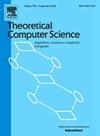鲁棒阵强盗优化:对抗性污染下的接近最优率
IF 1
4区 计算机科学
Q3 COMPUTER SCIENCE, THEORY & METHODS
引用次数: 0
摘要
我们研究了矩阵盗匪优化问题,这是一个基本的、广泛适用于组合多武装盗匪的框架,其中行动空间受矩阵约束。特别是,我们解决了设计在反馈奖励的对抗性污染下仍然有效的算法的挑战,这可能会严重降低性能甚至误导现有方法。我们的主要贡献是一种名为ROMM的高效鲁棒算法,该算法建立在乐观矩阵最大化原理之上,并利用鲁棒统计估计器在多项式时间内评估基臂质量。在ϵ-contamination模型下,我们建立了下界,并证明了ROMM在多对数因子下实现了近似最优的后悔保证。我们的分析进一步揭示了低污染和高污染之间的急剧相变。值得注意的是,ROMM可以容忍损坏反馈的普遍常数分数,这在温和的条件下是最优的。最后,我们用数值实验验证了我们的理论发现,证明了所提出方法的有效性。本文章由计算机程序翻译,如有差异,请以英文原文为准。
Robust matroid bandit optimization: Near-optimal rates under adversarial contamination
We study the matroid bandit optimization problem, a fundamental and broadly applicable framework for combinatorial multi-armed bandits where the action space is constrained by a matroid. In particular, we address the challenge of designing algorithms that remain effective under adversarial contamination of feedback rewards, which may severely degrade performance or even mislead existing methods. Our main contribution is an efficient and robust algorithm named ROMM, which builds upon the principle of optimistic matroid maximization and leverages robust statistical estimators to assess base arm quality in polynomial time. Under the ϵ-contamination model, we establish lower bounds and prove that ROMM achieves near-optimal regret guarantees up to polylogarithmic factors. Our analysis further reveals a sharp phase transition between the low and high contamination regimes. Notably, ROMM can tolerate up to a universal constant fraction of corrupted feedback, which is optimal under mild conditions. Finally, we validate our theoretical findings with numerical experiments that demonstrate the effectiveness of the proposed method.
求助全文
通过发布文献求助,成功后即可免费获取论文全文。
去求助
来源期刊

Theoretical Computer Science
工程技术-计算机:理论方法
CiteScore
2.60
自引率
18.20%
发文量
471
审稿时长
12.6 months
期刊介绍:
Theoretical Computer Science is mathematical and abstract in spirit, but it derives its motivation from practical and everyday computation. Its aim is to understand the nature of computation and, as a consequence of this understanding, provide more efficient methodologies. All papers introducing or studying mathematical, logic and formal concepts and methods are welcome, provided that their motivation is clearly drawn from the field of computing.
 求助内容:
求助内容: 应助结果提醒方式:
应助结果提醒方式:


